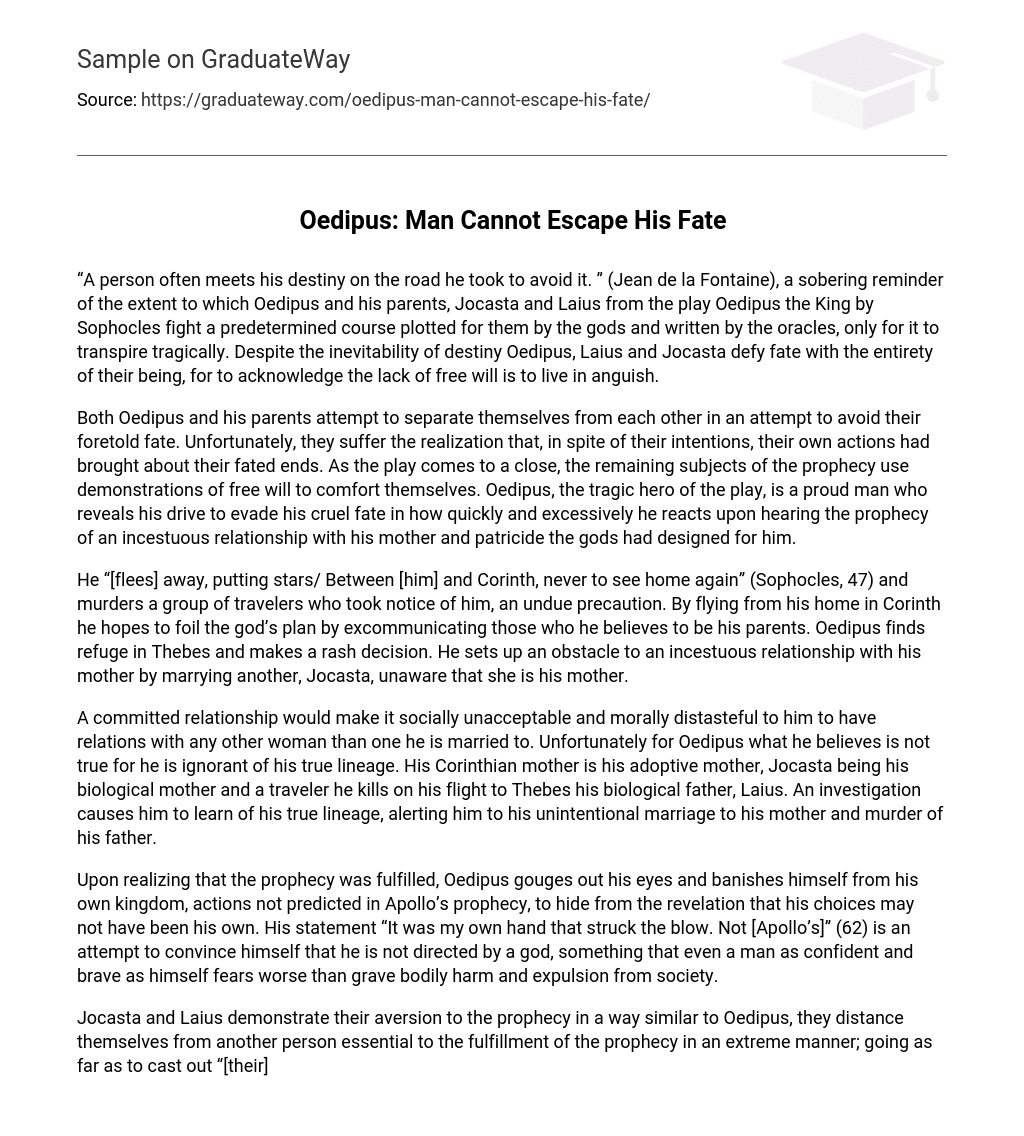“A person often meets his destiny on the road he took to avoid it.” – Jean de la Fontaine. This quote highlights how Oedipus, Jocasta, and Laius in Sophocles’ play Oedipus the King resisted a predetermined path outlined by the gods and oracles. Regrettably, their rebellion against fate resulted in tragic outcomes. Despite knowing that destiny is unavoidable, they refused to accept their lack of free will as it would mean living in constant anguish.
Both Oedipus and his parents attempt to distance themselves from each other in order to avoid the fate that had been foretold for them. Regrettably, they come to realize that their own actions were responsible for bringing about their predestined ends. As the play approaches its conclusion, those still affected by the prophecy find solace in the concept of free will. Oedipus, the tragic hero of the play, is a proud individual who demonstrates his determination to evade his cruel fate by responding swiftly and intensely to the prediction of engaging in incestuous relations with his mother and murdering his father, which had been planned by the gods.
He escapes, creating a separation between himself and Corinth, and vows to never return (Sophocles, 47). Additionally, he kills a band of passersby who had spotted him, believing it to be a necessary measure. In an attempt to prevent the gods’ predicted fate, he flees from his birthplace in Corinth, severing ties with those he believes to be his parents. Seeking shelter in Thebes, Oedipus hastily decides to marry another woman, Jocasta, as a way to avoid an incestuous relationship with his mother, unaware of her true identity.
A committed relationship would forbid him from having relations with any woman other than his wife, making it socially unacceptable and morally distasteful for him. Sadly, Oedipus is unaware of his true lineage, thus his belief is false. His adoptive mother from Corinth is not his biological mother; instead, Jocasta is his biological mother, and the man he unknowingly kills on his way to Thebes is his biological father, Laius. The discovery of his true lineage through an investigation shocks him, as he realizes he unintentionally married his own mother and murdered his father.
Upon realizing that the prophecy was fulfilled, Oedipus gouges out his eyes and banishes himself from his own kingdom, actions that were not predicted in Apollo’s prophecy, in order to conceal the possibility that his choices may not have been his own. His statement “It was my own hand that struck the blow. Not [Apollo’s]” (62) serves as an attempt to reassure himself that he is not under the control of a god, which is something he fears more than physical harm or being cast out of society.
Jocasta and Laius exhibit a similar aversion to the prophecy as Oedipus does. They distance themselves significantly from another person who is essential for the prophecy to be fulfilled. They even go to the extreme extent of casting out their own child, who is only three days old, with ankles riveted together, in order to leave them to die on a deserted mountain side. Aiming to change their future, Jocasta and Laius resort to abandoning their child, effectively committing infanticide. Following Laius’ demise, Jocasta expresses doubt towards prophecies and boldly declares “I don’t care about divination!”
Following this occurrence, I would decline any form of involvement. “(49). Jocasta’s dismissal of the prophecy’s trustworthiness is intended to safeguard herself from the terror brought upon by her decision to wed. The contradictory nature of initially accepting that a prophecy justifies murdering her own son and subsequently asserting that all prophecies are false is an attempt to evade acknowledging the futility of her deeds, which would result in immense distress for her. Eventually, Jocasta reaches a point where she can no longer deny the truth and chooses to end her life simultaneously with Oedipus discovering his true identity.
Jocasta, burdened by guilt for her heinous deeds and incestuous relationship, opts to end her own life. In a similar vein, Oedipus inflicts punishment upon himself by blinding and exiling himself as a means of seeking redemption for his transgressions. Both Jocasta’s suicide and Oedipus’ deliberate actions powerfully demonstrate humanity’s ceaseless endeavor to escape an unrelenting destiny.
Although death and physical suffering bring pain and isolation, it is important to reject a predetermined fate. People must believe in their power to control their own destiny, even when confronted with societal pressures, norms, and expectations. Ralph Waldo Emerson asserts that individuals often attribute their limitations to destiny but they must overcome these challenges – no matter how challenging they seem – in order to truly live instead of merely existing.





